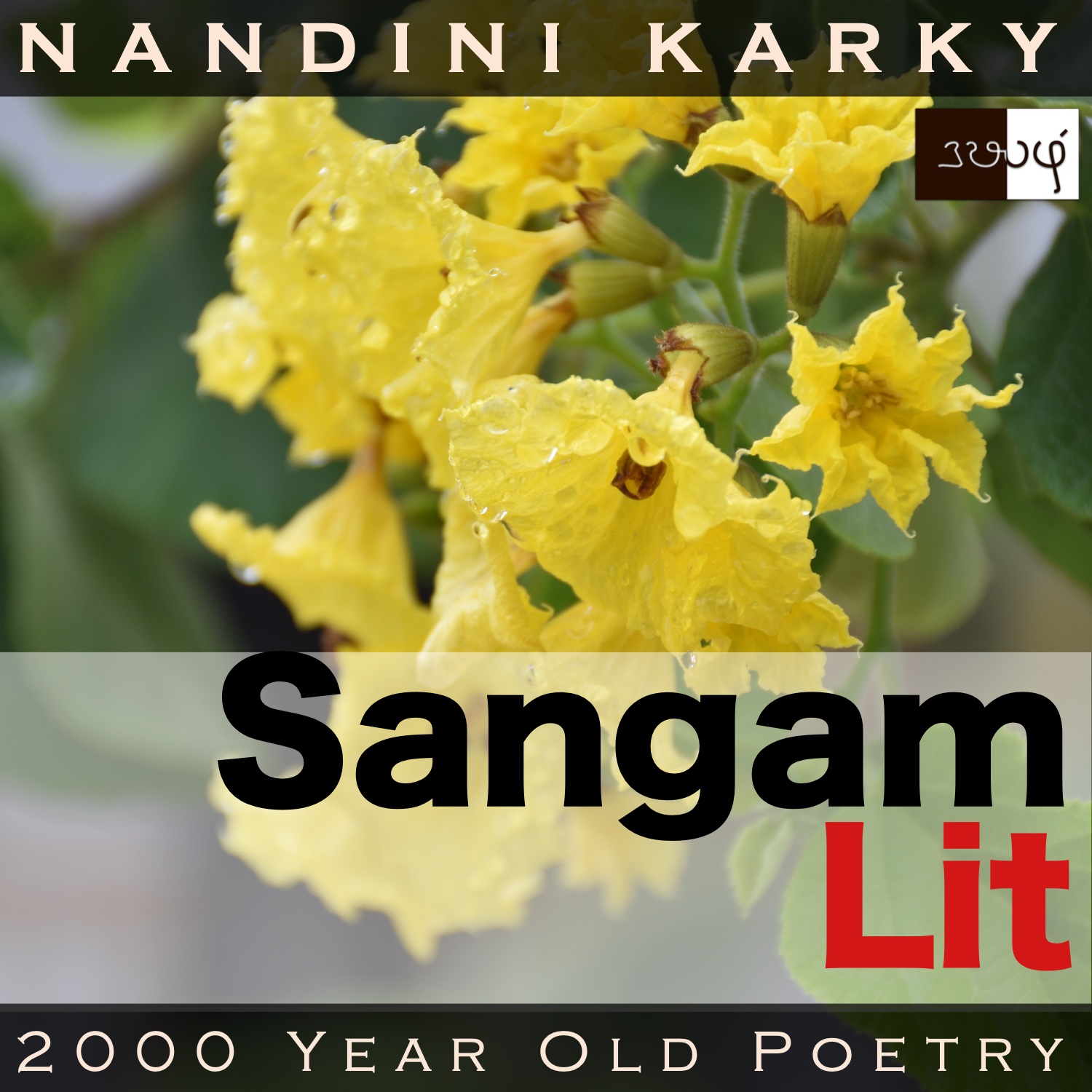Podcast: Play in new window | Download
Subscribe: Apple Podcasts | Spotify | Amazon Music | Android | iHeartRadio | TuneIn | RSS | More

In this episode, we perceive the nature of grief, as depicted in Sangam Literary work, Kurunthogai 241, penned by Kabilar. The verse is situated in the hills of ‘Kurinji’ and speaks in the voice of the lady to the confidante, conveying how she seems to have no control over the expression of her emotion.
யாம் எம் காமம் தாங்கவும், தாம் தம்
கெழுதகைமையின் அழுதன-தோழி!-
கன்று ஆற்றுப்படுத்த புன் தலைச் சிறாஅர்
மன்ற வேங்கை மலர் பதம் நோக்கி,
ஏறாது இட்ட ஏமப் பூசல்
விண் தோய் விடரகத்து இயம்பும்
குன்ற நாடற் கண்ட எம் கண்ணே.
‘They cry on their own’ says a voice in this verse. We’ll explore who that is, in a short while. The opening words ‘யாம் எம் காமம் தாங்கவும்’ meaning ‘even as I bear with my love disease’ imply the repeated advice rendered to a waiting lady about how she must put up with her man’s absence. The phrase ‘கெழுதகைமையின் அழுதன’ meaning ‘they cry owing to their special claim’ holds within the core thought of this verse. One of those rare glimpses of young children appears in ‘புன் தலைச் சிறாஅர்’ meaning ‘little boys with listless hair’. In ‘மன்ற வேங்கை’ meaning ‘Kino tree in the town centre’, we glance at a ubiquitous tree in this mountain region. A sound of joy echoes in ‘ஏமப் பூசல்’ meaning ‘uproarious sounds of delight’. Ending with the words ‘குன்ற நாடற் கண்ட எம் கண்ணே’ meaning ‘my eyes that saw the man of the mountains’, the verse welcomes us to look within and see the tales it tells.
On one side, there’s tears of sadness, and on the other, shouts of joy! The context reveals that the man and lady were leading a love relationship when the man parted away to gather wealth for their wedding. The lady languished, which made the confidante worry about her friend’s health. One day, the lady says to her confidante, “Even as I bear with my love affliction, because of their own special right, they cry, my friend! Scanty-haired little boys, who take calves grazing, on seeing the ‘vengai’ tree in the village centre has started to bloom, without climbing upon it, shout out with much uproar. The sounds of this clamour echoes on the ranges that rise to the skies in the man’s mountain country. Indeed, my eyes that saw him first, start to shed tears on their own accord!” With these words, the lady conveys to her friend that no matter how hard she tries, she’s unable to hold her emotions in rein, when the man was away from her.
Time to explore the nuances. The lady starts to talk about a nameless entity that seems to cry on its own, even as she’s trying to bear with the man’s separation, and adds that they do so, because they have the right to it. Even as we are wondering what she’s talking about, the lady goes on to describe a scene from the man’s mountain country, where little boys, who take calves grazing, seeing the flowers of the ‘vengai’ tree in the town centre, start to shout, the sound of which echoes back from the surrounding mountain ranges in the man’s land. Completing that description of the man’s place, the lady finally reveals who she was talking about, mentioning that to be her own eyes, which had seen the man!
What the lady means is that it was her eyes that saw the man first. Like how in many other Sangam verses, the protagonists separate their heart from themselves, in this verse, the lady separates her eyes from who she is. She says those eyes glimpsed the man first and because of that, they seem to have a special claim on him, and now, missing his presence, they seem to be shedding tears on their own. Many, many a way just to say, ‘I’m feeling sad missing my beloved’! Why do these Sangam verses dwell so much on the sorrow of being apart? Could it be the shout-out of the ancients to their successors, asking them never to suppress emotions within?




Different 😍